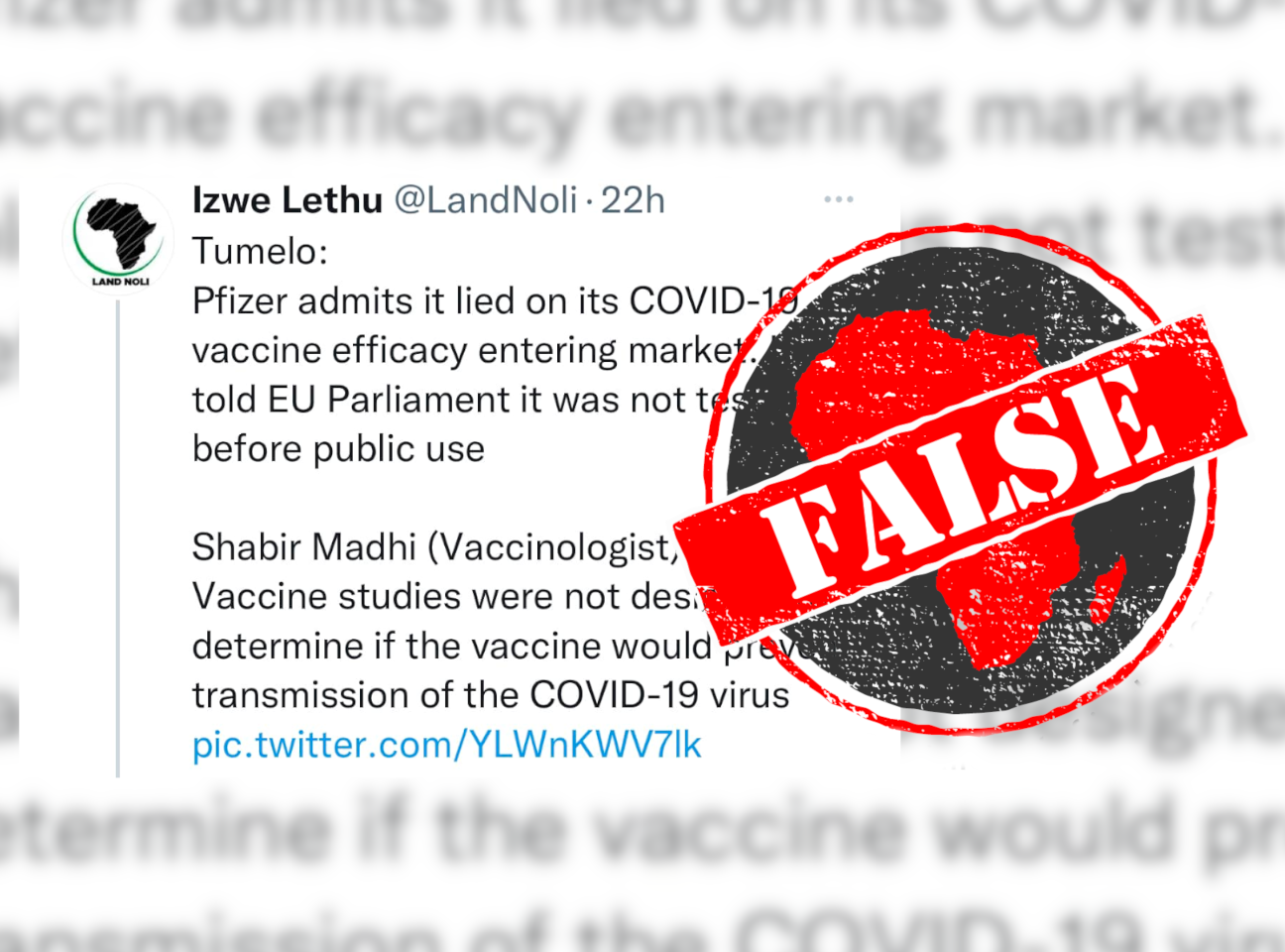IN SHORT: A claim that pharmaceutical company Pfizer has admitted to lying about testing the effectiveness of its Covid vaccine is still circulating on social media in South Africa. But this misrepresents what Pfizer said and the vaccine’s effectiveness in preventing Covid-19 was thoroughly tested.
Did pharma company Pfizer admit to the European parliament that it had lied about testing the efficacy of its Covid vaccine before the jab was rolled out to the public?
That’s the claim in a news report by South African TV broadcaster eNCA that’s been getting social media attention since October 2022.
“Now Pfizer has admitted it lied about its Covid vaccine efficacy before it entered the market,” the news anchor begins the segment by saying. “It told the European parliament it was not tested before general public use.”
She adds: “This is raising concern as many took the vaccine hoping it will protect them.”
The anchor then asks for comment from Prof Shabir Madhi, a leading vaccinologist and dean of the health sciences faculty at Wits University in Johannesburg.
“I think we need to be careful how we interpret what was said,” Madhi begins. He then discusses the difference between how vaccines prevent Covid transmission and how they protect against “symptomatic Covid-19”.
But he doesn’t challenge the anchor’s initial statement: that Pfizer admitted to the European parliament that it had lied, and that its vaccine had not been tested.
In fact, the text “PFIZER ADMITS ITS JAB WAS NOT TESTED” is displayed on the screen throughout the segment. But this is not true.

‘What else did they lie about?’
The video has found its way onto Facebook, Instagram and Twitter.
It’s also been edited and remixed in several TikTok videos, some posted as recently as May 2023, that add text effects such as “What else did they lie about?”.
In one video a TikTok user says: “I actually took the Pfizer jab. That awkward moment when you realise all those conspiracy theorists were not actually conspiracy theorists. They were onto something.”
Another, who admits she didn’t get the jab, says: “People thought we were crazy when we didn’t want to take the vaccine … Now I’m looking at this news and thinking, mm-hmm, told you so!”
The vaccine is formally known as the Pfizer BioNTech Covid-19 vaccine, with the brand name Comirnaty. It was first rolled out in December 2020, less than a year after Covid was initially identified.
And there’s ample evidence that the vaccine’s efficacy was thoroughly tested in a massive clinical trial with thousands of participants. It was found to be 95% effective against Covid.
Pfizer had no reason to lie. So what happened at the European parliament?
Pfizer rep misspoke during questioning
The eNCA segment reports on an exchange between Janine Small, Pfizer’s president of international developed markets, and a member of the European parliament (known as an MEP) during a committee hearing on Covid held on 10 October 2022.
When Small took questions from MEPs, she was confronted by Rob Roos, a conservative MEP from the Netherlands. Roos has tabled unsuccessful motions calling for a European compensation fund for “victims of the Covid-19 vaccines”, and for former US president Donald Trump to receive the Nobel peace prize.
“Was the Pfizer Covid vaccine tested on stopping the transmission of the virus before it entered the market?” Roos asked Small.
After answering questions from two other MEPs, Small responded to Roos. “Regarding the question about did we know about stopping immunisation before it was sent to the market – no.” She then laughs.
Small most probably meant to say “transmission” instead of “immunisation”, and Roos has himself acknowledged this.
“We really had to move at the speed of science,” she added.
Transmission versus efficacy
Small’s response quickly spread on conservative news sites and social media as proof that Pfizer had lied about testing its vaccine and had finally admitted to doing so.
But it wasn’t an admission. The Pfizer vaccine was developed to prevent the Covid-19 disease, particularly severe illness, after infection with the Sars-CoV-2 virus. (It does have to be administered before infection takes place.)
Preventing transmission of the virus between people was not a goal in the development of the vaccine. And so transmission was not tested in Pfizer’s clinical trial.
Despite this, soon after the vaccine’s rollout studies found it had reduced transmission of the virus among healthcare workers.
It is not true that Pfizer admitted to the European parliament that it lied about testing the efficacy of its Covid vaccine. A Pfizer executive said the vaccine’s ability to prevent transmission was not tested in its clinical trial.
Republish our content for free
For publishers: what to do if your post is rated false
A fact-checker has rated your Facebook or Instagram post as “false”, “altered”, “partly false” or “missing context”. This could have serious consequences. What do you do?
Click on our guide for the steps you should follow.
Publishers guideAfrica Check teams up with Facebook
Africa Check is a partner in Meta's third-party fact-checking programme to help stop the spread of false information on social media.
The content we rate as “false” will be downgraded on Facebook and Instagram. This means fewer people will see it.
You can also help identify false information on Facebook. This guide explains how.





Add new comment